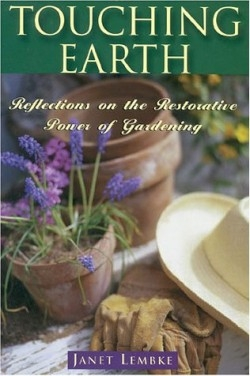Touching Earth
Reflections on the Restorative Power of Gardening
Humans were never meant to garden, but rather were meant to roam, to hunt and gather, writes the author, an acclaimed Southern naturalist. Those intentions, however, simply don’t matter anymore. “We can’t stop mucking around with earth and plants,” she writes. “There’s something downright seductive about grubbing in earth and growing our own food.”
In this eloquent volume of personal essays on the delights and discoveries of kitchen gardens, Lembke explores the terrain that goes with sowing seeds, from weeds to herbs to neighbors-the stuff that make touching earth so irresistible, so soothing, so enlivening.
In fluid prose, Lembke shares her deep knowledge of, and affection for, plant history, mythology and lore, classification and migration. In “The Lives of Vegetables,” for example, she profiles her own garden and tells tales of each item, from her precious tomatoes to outcast zucchini, which she reviles. Eggplants—the “mad-apple nightshade”—were once thought by northern Europeans to be poisonous, able to kill those foolish enough to take a bite.
Gardening can be liturgy, a restorative act. A practice where weeds become “excellent substitutes for all that riles” and where hope for renewal is sown, and grows. Gardens brim with life, Lembke points out, and gardening-touching earth-can revive a battered human spirit.
“It gave me a counterpoint to the dying marriage, the dead child,” she writes. “It gave surcease to grief and restored my calm. Now I garden for the gritty, sweaty, heart-soothing joy of it and for the ways in which it returns my joy-the sheen on an eggplant’s skin and the warmth of a tomato that’s been cradled in the sun’s hand.”
Lembke’s eleven essays range from homilies on basil to a delighted look at the mysticism of The Farmer’s Almanac to ruminations on changing American farming landscapes and our connections to territory. She liberally quotes naturalists through the ages, from Thomas Jefferson to Roman historian Pliny the Elder, and shares acres of information on the names of plants and their meanings-a familiarity that helps weeds and hybrids “cease to be strangers” and instead become acquaintances, if not friends.
Above all, she writes, “We look to gardening for an enduring logic, a reasonableness, an overarching harmony, amid the random assaults and discordances of being alive.”
Disclosure: This article is not an endorsement, but a review. The publisher of this book provided free copies of the book to have their book reviewed by a professional reviewer. No fee was paid by the publisher for this review. Foreword Reviews only recommends books that we love. Foreword Magazine, Inc. is disclosing this in accordance with the Federal Trade Commission’s 16 CFR, Part 255.

